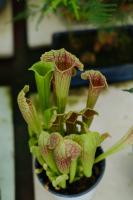A normal plant cell holds water in the vacuole
Plant cells are unique in many ways, and one of the most significant differences between plant cells and animal cells is the presence of a large, central vacuole in plant cells. The vacuole is a membrane-bound organelle that occupies most of the space in a plant cell and is responsible for a wide range of important functions, including storing nutrients, regulating osmotic pressure, and maintaining cell structure and stability.
However, perhaps the most important role of the vacuole is to hold water. Water is essential for plant cells to carry out many of their vital functions, such as photosynthesis, respiration, and growth. Unlike animal cells, which simply absorb water from their surroundings, plant cells must actively pump water into their cells from the soil through their roots. Once the water enters the cells, it is stored in the vacuole.
The vacuole is able to hold an incredible amount of water – in fact, it can often take up as much as 90% of the volume of a plant cell. This ability to store water is critical for plants, especially in arid or drought-prone environments, as it enables them to survive long periods of dryness without wilting or dying. When water is scarce, the plant will draw on the water stored in the vacuole to meet its needs.
In addition to storing water, the vacuole also plays an important role in regulating the osmotic pressure of plant cells. Osmotic pressure refers to the movement of water between different areas of a cell or between cells of different concentrations. When water moves from an area of high concentration to an area of low concentration, it creates a pressure gradient known as osmotic pressure. The vacuole helps to regulate this pressure by storing excess water when it is available and releasing it when the cell needs it.
Another important function of the vacuole is to maintain the structure and stability of the plant cell. The vacuole exerts pressure against the cell wall, which gives the plant its rigidity and shape. This pressure is known as turgor pressure, and it is critical for plant cells to maintain their structure and function properly. Without adequate turgor pressure, plant cells would collapse and lose their shape, which would have devastating consequences for the plant as a whole.
In conclusion, the vacuole is a critical component of a normal plant cell, and its ability to hold water is essential for the cell to carry out many of its vital functions. By regulating osmotic pressure and maintaining cell structure and stability, the vacuole plays an indispensable role in enabling plants to survive in a wide range of environments. Therefore, understanding the importance of the vacuole is crucial for anyone interested in the biology of plants and the ecosystems they inhabit.

 how many times do yo...
how many times do yo... how many planted tre...
how many planted tre... how many pine trees ...
how many pine trees ... how many pecan trees...
how many pecan trees... how many plants comp...
how many plants comp... how many plants can ...
how many plants can ... how many plants and ...
how many plants and ... how many pepper plan...
how many pepper plan...




























